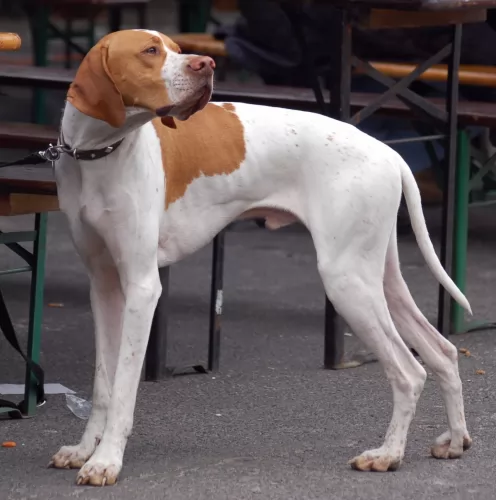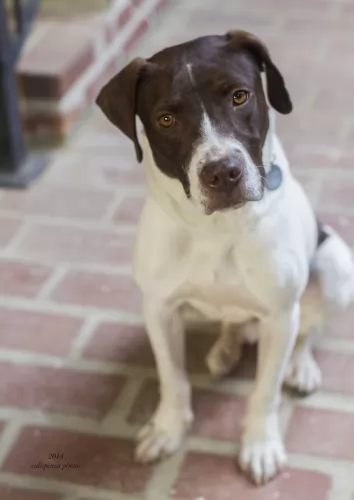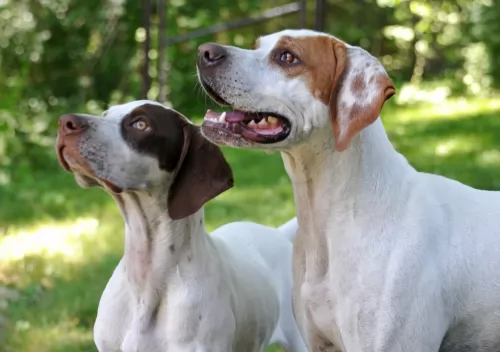 English Pointer is originated from United Kingdom but Yochon is originated from United States. English Pointer may grow 42 cm / 17 inches higher than Yochon. English Pointer may weigh 25 kg / 56 pounds more than Yochon. Both English Pointer and Yochon has same life span. Both English Pointer and Yochon has almost same litter size. English Pointer requires Low Maintenance. But Yochon requires Moderate Maintenance
English Pointer is originated from United Kingdom but Yochon is originated from United States. English Pointer may grow 42 cm / 17 inches higher than Yochon. English Pointer may weigh 25 kg / 56 pounds more than Yochon. Both English Pointer and Yochon has same life span. Both English Pointer and Yochon has almost same litter size. English Pointer requires Low Maintenance. But Yochon requires Moderate Maintenance
Basic Information
Group:
Sporting dog
Toy dog
undefined
United Kingdom
United States
Life Span:
12 - 14 Years
10 - 14 Years
Other Names:
English Pointer, Pointer
Bichyorkie • Borkie • Yo-Chon • Yochon • Yorki-Chon • Yorkichon • Yorkiechon • Yorkie-Chon • Yorkie-Bichon • Yorkshire Frise
Colors Available:
Black, Black & White, Lemon & White, Liver, Orange & White, Liver & White
Black, Blonde, Brown, Cream, Dark, Brown, Golden, Gray, White
Coat:
short, smooth and shiny
silky or curly very full coat
Temperament:
Alert, Courageous, Energetic, Gentle, Independent, Loyal, Protective, Sweet
Alert, Energetic, Friendly, Independent, Intelligent, Loving, Playful
Grooming:
Low Maintenance
Moderate Maintenance
Trainability:
Moderate
Moderate
New Owners Friendly:
No
Yes
History
 We can find records for pointers from 17th century. Breeds such as Old Spanish and Portuguese Pointer were set in to England from European Mainland. In 1800s they were brought to America and then they slowly developed their hunting skills and in 1910 they became an excellent bird hunter. In 1936 Modern American Kennel was established and they bred pointers in large quantities. They are very popular in southern United States and are called as "bird dog". Pointers are good in hunting birds like pheasant and grouse. They got their name because of their special skills in hunting.
We can find records for pointers from 17th century. Breeds such as Old Spanish and Portuguese Pointer were set in to England from European Mainland. In 1800s they were brought to America and then they slowly developed their hunting skills and in 1910 they became an excellent bird hunter. In 1936 Modern American Kennel was established and they bred pointers in large quantities. They are very popular in southern United States and are called as "bird dog". Pointers are good in hunting birds like pheasant and grouse. They got their name because of their special skills in hunting.
The Yochon is a “designer dog” – a cross between the Yorkshire Terrier and the Bichon Frise. They are not a purebred and are not recognized by purebred dog clubs such as the American Kennel Club (AKC). They are small, playful, families dogs. Most of them bear the best characteristics of each of their founding breeds, but because they are crossbreeds and most will be multi-generational cross breeds, there are no two dogs alike.
Though not recognized by the traditional purebred clubs they are recognized by several hybrid canine clubs. The cross was developed in the United States.
Description
 Pointer has a long head and its body is perfectly suitable for hunting. In hunting the pointers shows hunter the direction of the bird and also they will go and get them after they were shot. They are well known for their speed, energy and continuous working. Pointers are also a good companion dog and love the family members so much. It is very easy to groom them as they have short coat. They are very alert and excellent watch dog.
Pointer has a long head and its body is perfectly suitable for hunting. In hunting the pointers shows hunter the direction of the bird and also they will go and get them after they were shot. They are well known for their speed, energy and continuous working. Pointers are also a good companion dog and love the family members so much. It is very easy to groom them as they have short coat. They are very alert and excellent watch dog.
If pointer is not set in huntng then they should be given lots of exercise daily. Pointers love to play and run with children. They will give a good company for cyclists. Pointers show their talents in dog shows especially in obedience and field trials. They will not worry about the crowd surrounding them and performs well. In performing at public, pointer will show perfect attention to its master. Pointer must be trained slowly from its puppyhood to get good results.
Yochons go by many different names but in general they are toy dogs, weighing in at under 20 pounds, most weighing 6-12 pounds. They have black noses, long tails, and round eyes. Their muzzles are blunt and their skulls are also round.
They have fluffy, full coats that can range from tan, to brown to black. They can also be white or cream. Their ears can be either hanging or erect.
Characteristics
Special talents
 Pointer is a wonderful kid friendly dog and a nice companion. Also he is very energetic,fun-loving and an excellent watchdog. Pointers are very courageous as well as obedient. They can work for a very long time. Early socialization will make them with a good behaviour.
Pointer is a wonderful kid friendly dog and a nice companion. Also he is very energetic,fun-loving and an excellent watchdog. Pointers are very courageous as well as obedient. They can work for a very long time. Early socialization will make them with a good behaviour.
Adaptability
They will be happy if they are given a fenced yard to play and spend their natural energy. They will not have a good behaviour in apartment living. Pointers always likes to be with some one in his family. They are suitable for areas having hot weather and they will not do better in cold weather.
Learning ability
Pointers have very high intelligence and thus they are very easy to train. Good behaviours must be taught to them and the main word they must learn is "NO". They should stop what they are doing when they hear the word "NO" from you. "Sit" is another important word they should learn. Training should be given friendly and not compelling them to do it. Giving reward to them will make them happy and give more interest in training.
1 Children friendliness -yes very good but watch careful that children do not hurt them as they are so small and fragile.
2.Special talents – Loves families and playing
3.Adaptability – adapts well to apartments can play indoors
4.Learning ability – intelligent and independent
Health Problems
 Pointers face health problems such as gastric torsion, hypothyroidism and canine hip dysplasia. Overweight will also lead to many health problems in them. Other problems seen in them are cardiomyopathy, ectropion and progressive retinal atrophy.
Pointers face health problems such as gastric torsion, hypothyroidism and canine hip dysplasia. Overweight will also lead to many health problems in them. Other problems seen in them are cardiomyopathy, ectropion and progressive retinal atrophy.
Hair fall
They have the chances to get several skin disorders which leads to hairfall. Follicular Dysplasia is a hereditary disorder which causes hairfall. Special shampoos or lotion to combat the dry skin should be used to overcome this problem.
Both founding breeds are vulnerable to a few medical conditions. These include:
• Legg-Calve-Perthes Disease – insufficient blood to hind legs, thigh bones causing lameness.
• Patellar Luxation – slipped kneecaps can also cause lameness.
• Dental Issues – keep teeth brushed and cleaned.
• Hypothyroidism – can be treated with medication.
• Reverse Sneezing
• Allergies
• Collapsed Trachea due to small size – be careful with them at all times.
Caring The Pet
Feeding the puppy
 Normally puppies require more food when compared with adult to meet their growth needs. The food given to the pointer puppy must contain vitamins, carbohydrates and minerals. Also the food given to his mother should be continued to the puppy as to avoid digestive problems for the puppy. If it is needed to change the food then it should be done in a step by step process.
Normally puppies require more food when compared with adult to meet their growth needs. The food given to the pointer puppy must contain vitamins, carbohydrates and minerals. Also the food given to his mother should be continued to the puppy as to avoid digestive problems for the puppy. If it is needed to change the food then it should be done in a step by step process.
Feeding the adult
Pointer can be fed one or two times a day. Usally small meal is given in morning and full meal will be given in the evening. But in case if they will be left alone for the whole day then morning food shall be a full meal. They can be fed meat of goat, pork, fish and woodcock. Brown rice is a good food for pointer.
Points for Good Health
Pointers will be happy if they are always with their family. They enjoy when they are taken outside for playing or camping. Puppies don't need much exercise as adults need. Adults should not be fed too much as it will lead to overweight.
Games and Exercises
When pointer is given proper exercises and training they will be a very good mannered dog. They are very active and intelligent dogs and hence require exercise and training regularly. The breed was developed to be a hunting dog and can work continuously in a day. Pointers should be exercised a minimum of an hour per day. They will be happy to run along with your bicycle and playing frisbee with you.
3.Feeding the puppy – do not overfeed. Use a high quality puppy toy breed kibble. Feed 3-4 X day.
2.Feeding the adult – do not overfeed. Use a high quality adult toy breed kibble. Feed at least twice a day.
3.Points for Good Health hearty/general good health and stamina
4. Games and Exercises does not need a lot of exercise . They enjoy obedience and agility trials.
Comparison with other breeds
- English Pointer vs English Bulldog - Breed Comparison
- English Pointer vs German Shepherd - Breed Comparison
- English Pointer vs Golden Retriever - Breed Comparison
- English Pointer vs Labrador Retriever - Breed Comparison
- English Pointer vs West Highland White Terrier - Breed Comparison
- English Pointer vs French Bulldog - Breed Comparison
- English Pointer vs Beagle - Breed Comparison
- English Pointer vs Yorkshire Terrier - Breed Comparison
- English Pointer vs Poodle - Breed Comparison
- English Pointer vs Rottweiler - Breed Comparison
- English Pointer vs Boxer - Breed Comparison
- Siberian Husky vs English Pointer - Breed Comparison
- Doberman Pinscher vs English Pointer - Breed Comparison
- American Bully vs English Pointer - Breed Comparison
- Abruzzenhund vs English Pointer - Breed Comparison
- Affenpinscher vs English Pointer - Breed Comparison
- Afghan Hound vs English Pointer - Breed Comparison
- Aidi vs English Pointer - Breed Comparison
- Airedale Terrier vs English Pointer - Breed Comparison
- Akbash Dog vs English Pointer - Breed Comparison
- Akita vs English Pointer - Breed Comparison
- Africanis vs English Pointer - Breed Comparison
- Askal vs English Pointer - Breed Comparison
- Atlas Terrier vs English Pointer - Breed Comparison
- Aussie Poo vs English Pointer - Breed Comparison
- Yochon vs English Bulldog - Breed Comparison
- Yochon vs German Shepherd - Breed Comparison
- Yochon vs Golden Retriever - Breed Comparison
- Yochon vs Labrador Retriever - Breed Comparison
- Yochon vs West Highland White Terrier - Breed Comparison
- Yochon vs French Bulldog - Breed Comparison
- Yochon vs Beagle - Breed Comparison
- Yochon vs Yorkshire Terrier - Breed Comparison
- Yochon vs Poodle - Breed Comparison
- Yochon vs Rottweiler - Breed Comparison
- Yochon vs Boxer - Breed Comparison
- Yochon vs English Pointer - Breed Comparison
- Yochon vs Siberian Husky - Breed Comparison
- Yochon vs Doberman Pinscher - Breed Comparison
- Yochon vs American Bully - Breed Comparison
- Yochon vs Abruzzenhund - Breed Comparison
- Yochon vs Affenpinscher - Breed Comparison
- Yochon vs Afghan Hound - Breed Comparison
- Yochon vs Aidi - Breed Comparison
- Yochon vs Airedale Terrier - Breed Comparison
- Yochon vs Akbash Dog - Breed Comparison
- Yochon vs Akita - Breed Comparison
- Yochon vs Africanis - Breed Comparison
- Yochon vs Askal - Breed Comparison
- Yochon vs Atlas Terrier - Breed Comparison
 Petzlover
Petzlover English Pointer is originated from United Kingdom but Yochon is originated from United States. English Pointer may grow 42 cm / 17 inches higher than Yochon. English Pointer may weigh 25 kg / 56 pounds more than Yochon. Both English Pointer and Yochon has same life span. Both English Pointer and Yochon has almost same litter size. English Pointer requires Low Maintenance. But Yochon requires Moderate Maintenance
English Pointer is originated from United Kingdom but Yochon is originated from United States. English Pointer may grow 42 cm / 17 inches higher than Yochon. English Pointer may weigh 25 kg / 56 pounds more than Yochon. Both English Pointer and Yochon has same life span. Both English Pointer and Yochon has almost same litter size. English Pointer requires Low Maintenance. But Yochon requires Moderate Maintenance We can find records for pointers from 17th century. Breeds such as Old Spanish and Portuguese Pointer were set in to England from European Mainland. In 1800s they were brought to America and then they slowly developed their hunting skills and in 1910 they became an excellent bird hunter. In 1936 Modern American Kennel was established and they bred pointers in large quantities. They are very popular in southern United States and are called as "bird dog". Pointers are good in hunting birds like pheasant and grouse. They got their name because of their special skills in hunting.
We can find records for pointers from 17th century. Breeds such as Old Spanish and Portuguese Pointer were set in to England from European Mainland. In 1800s they were brought to America and then they slowly developed their hunting skills and in 1910 they became an excellent bird hunter. In 1936 Modern American Kennel was established and they bred pointers in large quantities. They are very popular in southern United States and are called as "bird dog". Pointers are good in hunting birds like pheasant and grouse. They got their name because of their special skills in hunting. Pointer has a long head and its body is perfectly suitable for hunting. In hunting the pointers shows hunter the direction of the bird and also they will go and get them after they were shot. They are well known for their speed, energy and continuous working. Pointers are also a good companion dog and love the family members so much. It is very easy to groom them as they have short coat. They are very alert and excellent watch dog.
Pointer has a long head and its body is perfectly suitable for hunting. In hunting the pointers shows hunter the direction of the bird and also they will go and get them after they were shot. They are well known for their speed, energy and continuous working. Pointers are also a good companion dog and love the family members so much. It is very easy to groom them as they have short coat. They are very alert and excellent watch dog. Pointer is a wonderful kid friendly dog and a nice companion. Also he is very energetic,fun-loving and an excellent watchdog. Pointers are very courageous as well as obedient. They can work for a very long time. Early socialization will make them with a good behaviour.
Pointer is a wonderful kid friendly dog and a nice companion. Also he is very energetic,fun-loving and an excellent watchdog. Pointers are very courageous as well as obedient. They can work for a very long time. Early socialization will make them with a good behaviour. Pointers face health problems such as gastric torsion, hypothyroidism and canine hip dysplasia. Overweight will also lead to many health problems in them. Other problems seen in them are cardiomyopathy, ectropion and progressive retinal atrophy.
Pointers face health problems such as gastric torsion, hypothyroidism and canine hip dysplasia. Overweight will also lead to many health problems in them. Other problems seen in them are cardiomyopathy, ectropion and progressive retinal atrophy. Normally puppies require more food when compared with adult to meet their growth needs. The food given to the pointer puppy must contain vitamins, carbohydrates and minerals. Also the food given to his mother should be continued to the puppy as to avoid digestive problems for the puppy. If it is needed to change the food then it should be done in a step by step process.
Normally puppies require more food when compared with adult to meet their growth needs. The food given to the pointer puppy must contain vitamins, carbohydrates and minerals. Also the food given to his mother should be continued to the puppy as to avoid digestive problems for the puppy. If it is needed to change the food then it should be done in a step by step process.